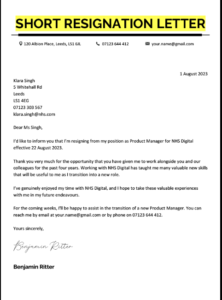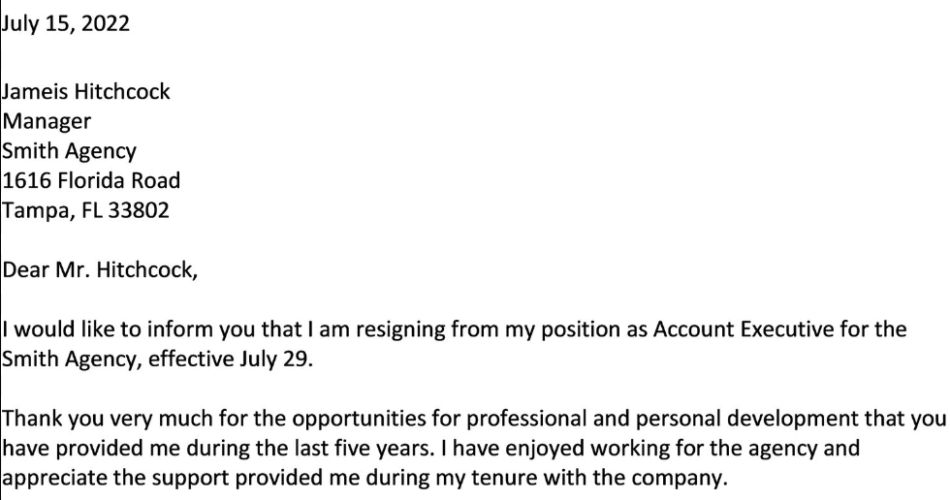As an experienced professional, I understand the importance of navigating the resignation process with grace and professionalism. Leaving a job, whether it’s for a new opportunity or personal reasons, can be a delicate and emotional experience. However, by crafting a well-written letter of resignation, you can ensure a smooth transition and maintain positive relationships with your employer.

Letter of Resignation
Contents
- 1 The Importance of a Professional Letter of Resignation
- 2 When to Submit a Letter of Resignation
- 3 How to Format a Letter of Resignation
- 4 Key Components of a Letter of Resignation
- 5 Dos and Don’ts of Writing a Letter of Resignation
- 6 ionDos:
- 7 Tips for Maintaining Professionalism in Your Resignation Letter
- 8 Sample Resignation Letter Templates
- 9 Common Mistakes to Avoid in a Letter of Resignation
- 10 How to Handle the Resignation Process with Your Employer
- 11 Conclusion and Next Steps for a Smooth Career Transition
The Importance of a Professional Letter of Resignation
A letter of resignation is more than just a formal notification of your departure – it’s a reflection of your character and professionalism. This document can have a lasting impact on your professional reputation, as it sets the tone for your exit and can influence future recommendations or references. By taking the time to compose a thoughtful and well-structured letter, you demonstrate your respect for your employer and your commitment to a positive closure.
When to Submit a Letter of Resignation
The timing of your resignation letter is crucial. Ideally, you should submit your letter at least two weeks before your intended last day of work, as this is the standard notice period in many industries. This allows your employer to make the necessary arrangements for your departure and transition your responsibilities to another team member or a new hire.
How to Format a Letter of Resignation
The format of your resignation letter should be professional and consistent with standard business communication. Here’s a recommended structure:
- Heading: Include your name, current job title, and contact information at the top of the letter.
- Date: Provide the current date on which you are submitting the letter.
- Addressee: Formally address the letter to your direct supervisor or the appropriate human resources representative.
- Opening: Begin the letter with a clear statement of your intention to resign, including your last day of work.
- Body: Provide a brief explanation for your resignation, if appropriate, and express gratitude for the opportunities and experiences you’ve had during your tenure.
- Closing: Thank your employer for their time and consideration, and offer to assist with the transition process.
- Signature: Close the letter with a professional sign-off, such as “Sincerely” or “Best regards,” followed by your handwritten or electronic signature.
Key Components of a Letter of Resignation
When crafting your letter of resignation, be sure to include the following key elements:
- Resignation Statement: Clearly state your intention to resign and provide the specific date of your last day of work.
- Reason for Resignation: If appropriate, briefly explain the reason for your resignation, such as a new job opportunity or personal circumstances. Keep this section concise and professional.
- Appreciation and Gratitude: Express your appreciation for the opportunities and experiences you’ve had during your time with the company. Acknowledge the contributions of your colleagues and supervisors.
- Offer of Assistance: Offer to assist with the transition process, such as training a replacement, completing outstanding projects, or providing any necessary information or documentation.
- Well Wishes: Close the letter with well wishes for the continued success of the company and your colleagues.
Dos and Don’ts of Writing a Letter of Resignation
ionDos:
- Be professional, polite, and gracious in your tone.
- Keep the letter concise and to the point.
- Provide a clear and specific last day of work.
- Offer to assist with the transition process.
- Express gratitude for the opportunities and experiences you’ve had.
- Maintain a positive and forward-looking attitude.
Don’ts:
- Avoid venting frustrations or criticizing the company or your colleagues.
- Do not make demands or negotiate terms of your departure.
- Refrain from discussing sensitive or confidential information.
- Steer clear of overly emotional language or personal details.
- Do not burn bridges or leave on a negative note.
Tips for Maintaining Professionalism in Your Resignation Letter
- Keep it Positive: Focus on the positive aspects of your experience and avoid any negative comments or complaints.
- Be Gracious: Express your gratitude for the opportunities and experiences you’ve had during your time with the company.
- Avoid Oversharing: While it’s important to be transparent about your reasons for leaving, avoid delving into personal details or sensitive information.
- Offer Assistance: Demonstrate your commitment to a smooth transition by offering to assist with training, documentation, or any outstanding tasks.
- Maintain Confidentiality: Respect the confidentiality of your employer and refrain from discussing sensitive information.
Sample Resignation Letter Templates
Here are two sample resignation letter templates to help you get started:
Sample 1: Formal Resignation Letter
[Your Name] [Your Address] [Your Phone Number] [Your Email] [Date] [Employer’s Name] [Employer’s Title] [Company Name] [Company Address]Dear [Employer’s Name],
I am writing to inform you of my resignation from [Company Name], effective [Last Day of Work]. My last day of employment will be [Last Day of Work].
During my time at [Company Name], I have had the opportunity to work with an exceptional team and contribute to the growth and success of the organization. I am grateful for the experiences and professional development opportunities that I have gained, and I appreciate the support and guidance I have received from my colleagues and supervisors.
I am leaving [Company Name] to pursue a new opportunity as [New Job Title] at [New Company Name]. While I am excited about this next chapter in my career, I want to assure you that I will do my best to ensure a smooth transition of my responsibilities and projects.
Please let me know if there is anything I can do to assist during this transition period. I am committed to working diligently to complete any outstanding tasks and to provide any necessary information or documentation to the appropriate team members.
Thank you for your understanding and support. I wish you and the entire [Company Name] team continued success.
Sincerely,
[Your Name]Sample 2: Informal Resignation Letter
Dear [Supervisor’s Name],
I am writing to inform you of my resignation from [Company Name], effective [Last Day of Work]. My last day of employment will be [Last Day of Work].
I have greatly enjoyed my time at [Company Name] and am grateful for the opportunities for growth and development that I have had during my [Duration of Employment] tenure. The experience and skills I have gained here have been invaluable, and I am thankful for the support and guidance of my colleagues and supervisors.
However, I have decided to pursue a new opportunity as [New Job Title] at [New Company Name]. While I am excited about this next chapter in my career, I want to assure you that I will do my best to ensure a smooth transition of my responsibilities and projects.
Please let me know if there is anything I can do to assist during this transition period. I am committed to working diligently to complete any outstanding tasks and to provide any necessary information or documentation to the appropriate team members.
Thank you for your understanding and support. I wish you and the entire [Company Name] team continued success.
Sincerely,
[Your Name]Common Mistakes to Avoid in a Letter of Resignation
- Venting Frustrations: Avoid airing any grievances or criticizing the company, your colleagues, or your supervisors. Keep the tone professional and polite.
- Oversharing Personal Details: While it’s important to explain your reasons for leaving, refrain from delving into sensitive personal information.
- Demanding or Negotiating: This is not the time to make demands or negotiate the terms of your departure. Maintain a cooperative and respectful attitude.
- Lack of Professionalism: Ensure that your letter is well-written, free of errors, and follows standard business communication conventions.
- Failure to Offer Assistance: Demonstrate your commitment to a smooth transition by offering to assist with the handover of your responsibilities and projects.
How to Handle the Resignation Process with Your Employer
When resigning from your job, it’s important to handle the process with care and professionalism. Here are some tips to ensure a smooth transition:
- Schedule a Meeting: Request a meeting with your direct supervisor or the appropriate HR representative to discuss your resignation in person.
- Provide Advance Notice: Give your employer the standard two-week notice, or more if possible, to allow them time to prepare for your departure.
- Be Transparent: Explain your reasons for leaving, but avoid airing any grievances or criticizing the company or your colleagues.
- Offer Assistance: Volunteer to help train a replacement, document your processes, or complete any outstanding tasks.
- Maintain Confidentiality: Respect the confidentiality of your employer and refrain from discussing sensitive information.
- Depart Gracefully: On your last day, express your gratitude, say your goodbyes, and leave on a positive note.
Conclusion and Next Steps for a Smooth Career Transition
Crafting a professional letter of resignation is a critical step in navigating a smooth career transition. By following the guidelines outlined in this article, you can ensure that your departure is handled with grace and professionalism, leaving a lasting positive impression on your employer and colleagues.
As you embark on your next professional journey, I encourage you to download our free resignation letter template to help you get started. This customizable template will guide you through the process of crafting a well-structured and thoughtful resignation letter that will set the tone for a positive closure to your current role
